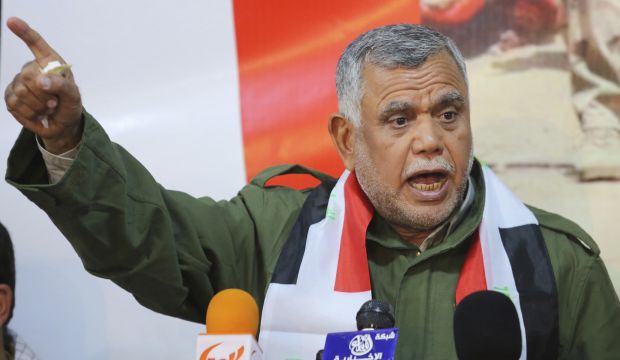
Head of the Badr Organisation Hadi Al-Amiri speaks during a news conference on the outskirts of Diyala province, north of Baghdad, on February 2, 2015. (REUTERS/Stringer)
Speaking to Asharq Al-Awsat on Tuesday, Iraq’s minister for human rights, Mohammed Mahdi Al-Bayati, said that the Iraqi government had asked Abu Dhabi to reconsider its decision to blacklist the Badr Organization led by Iraq’s former transport minister Hadi Al-Ameri.
The minister said that Baghdad had made the same request regarding the Saraya Al-Salam (Peace Brigades), which is part of the movement led by populist Shi’ite cleric Muqtada Al-Sadr.
Both militias have joined what has become known as “the popular mobilization forces,” an umbrella of anti-ISIS groups formed in response to Grand Ayatollah Ali Al-Sistani’s call to protect Iraq’s Shi’ite shrines from the attacks from the Sunni radical organization.
Critics accuse the two militias of what they describe as “violations” against civilians, and have called on the Iraqi government to rely solely on regular security and military forces in the fight against terrorism.
According to Bayati, Baghdad lodged the request on the basis that both militias are represented in the cabinet and parliament and are operating according to a national agenda that recognizes the rights of all of Iraq’s religious and ethnic communities.
Also on the UAE’s 83-strong terror list are Asa’ib Ahl Al-Haq—an offshoot of Sadr’s movement—as well as Al-Yaoum Al-Maou’d and the Ansar Al-Islam group.
Bayati also said that Iraq was reforming its own counter-terror efforts, including new trials for female prisoners detained on terror charges to make sure the verdicts they receive are fair.
As for the deportation of foreign prisoners, the minister said Iraqi law will adjudicate in this matter.
Several Arab governments have signed prisoner swap agreements with Baghdad.
